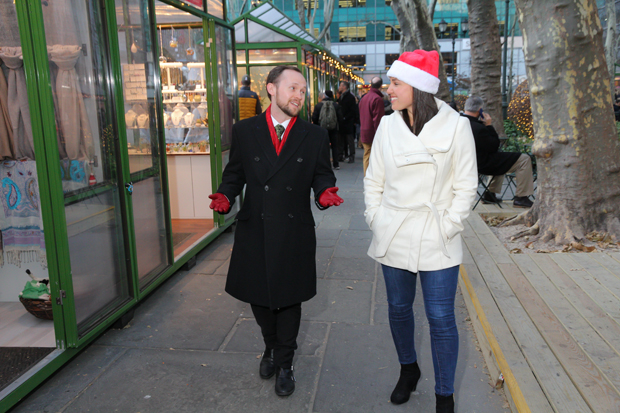Point-Counterpoint: Is It Time to Kill A Christmas Carol?
One of TheaterMania’s critics defends the honor of the holiday ritual. The other thinks it’s dead as a doornail.

(© Seth Walters)
Roast turkey or deep-fried? Claymation or C.G.I.? Bing Crosby or Mariah Carey? Year after year the holiday season pits tradition against innovation, and year after year we land on one side or the other in our annual quest for holiday spirit. No piece of yuletide culture exemplifies this tug-of-war-on-Christmas better than the theatrical tradition of A Christmas Carol. From Thanksgiving to New Year's, the Dickens classic is never far away, with dozens of productions popping up across the country — some with Scrooges who have been at the job for decades. Enduring institution or expired museum theater? Hayley Levitt fends off Zachary Stewart's bah-humbugs as these two TheaterMania critics debate the issue through the decorated streets of New York City.

(© Seth Walters)
Hayley Levitt: Zach, we're in the thick of the holiday season — which in the theater world means the A Christmas Carol season. Are you excited for another year of the holiday tradition or are you more of a Scrooge about the whole thing?
Zachary Stewart: At the risk of sounding like Scrooge, I can confidently state that I have no interest in seeing a repertory production of A Christmas Carol. It's not that I hate Christmas, or even the treacly and verbose Charles Dickens. I just think that it is the most expected thing a theater could produce this time of year, and I'm a firm believer that the theater dies on the altar of the expected. There has to be a better way to celebrate the season while leading audiences to new and surprising places.
Hayley: New, innovative theater is great. But the reason we love the Christmas season so much is because it's a collective breather from that constant push to innovate. It's the one chunk of time we let ourselves off the hook — doing the same exact things with the same exact people year after year, without feeling stagnant or unproductive. If A Christmas Carol is the theatrical version of that mental and emotional vacation, what's the harm?
Zach: The harm is that it teaches a potential growth segment of the audience that escapism is all that the theater can do. There's a passage in Max Posner's play Judy, which is set in the year 2040, in which an adult teaches a child what a play is: "They were these events people went to around Christmastime. People recited words to each other in the same order, in the same outfits, night after night…And we would pay a lot of money to go sit." We may laugh at that description, but for a lot of people who only attend the theater once a year, it's already a reality. You and I both know that the theater can do more. So why should theaters serve the same nuked leftovers the one time that irregular theatergoers show up?

(© Seth Walters)
Hayley: Why do you think they're showing up at all? Because these theaters are putting on a recognizable title with an accessible story that may inspire theater newbies to become theater regulars. And as theater gateway drugs go, you could do far worse than A Christmas Carol. It's a piece of literature with a valuable message about generosity and charitable giving. We shouldn't need a 175-year-old novel to remind us that those things are good, but considering all of the cruelty that fills our social media feeds, I want a ghost yelling "mankind was my business!" at everyone in America at least once a year.
Zach: "Charitable giving" makes it sound like a play about an endowment, which somewhat undermines Dickens's admittedly radical message about economic justice. I actually admire productions that try to emphasize this aspect of the show, like John Kevin Jones's solo version at the Merchant's House Museum, which includes the impoverished street urchin characters Ignorance and Want that are regularly excised from other productions. If theaters insist on doing A Christmas Carol every December, they should go even further in making a case for the play's relevance. In 2017, Scrooge looks more like a check-cashing entrepreneur with a series of shell companies and secretive bank accounts in Panama.
Hayley: Audiences could also connect those dots themselves. We can have this same debate about Shakespeare. His work is modernized all the time — just last summer we saw the controversial Julius Caesar in Central Park that heavily underlined all of America's political baggage — and a lot of people took issue with how on the nose that interpretation was. We don't need a Donald Trump Ebenezer Scrooge to internalize the dangers of capitalistic greed in modern society. We also don't complain about all the Hamlets we have to see every year, so why single out Dickens for his holiday niche?

(© Seth Walters)
Zach: If audiences are offended by the sight of Scrooge in a Brioni suit, I think that's all the more reason to do it. After all, Dickens wrote the play to be about contemporary characters. Padding his story's sharp elbows in downy nostalgia just gives those in the audience with Scrooge-like tendencies a pass by making it seem like this behavior is firmly behind us. It's not. Of course, theaters can avoid this entire debate and help reduce the surplus Scrooge population by producing a new Christmas play by a local writer.
Hayley: That's a big ask of a theater that probably relies on their Christmastime income to support a season of new work. Not to mention, if we stop producing A Christmas Carol at Christmastime, we'll never see it again, which makes the ritualistic person in me very sad. And that's coming from a New Jersey Jew.
Zach: I'm sympathetic to the economic realities of producing, and that a profitable run of A Christmas Carol often subsidizes the rest of the season. I'm still not convinced that they are coming for A Christmas Carol specifically. Like casual Catholics who attend midnight mass, they're making a holiday pilgrimage (the success of other holiday titles, like A Christmas Story and Santaland Diaries, supports this theory). As long as they're coming just once a year, why not give them something new?

(© Seth Walters)
Hayley: It's not new for us because we see theater all the time. But maybe it is new for them — not to undersell the value of new work, which I think we should always encourage. Christmas is definitely a time we let traditions lure us into a creative rut…which explains why Mariah Carey and Wham! are the only artists you'll hear on the radio between November and January. But don't throw out the baby with the Christmas bath water. We just need to remember why A Christmas Carol became our holiday tradition in the first place so we don't just mindlessly set it on repeat like "All I Want for Christmas Is You."
Zach: With points like that, who needs counterpoints? I completely agree that Dickens has become the Mariah Carey of the theater. It's time to change the channel, before we have a very unhappy New Year.









